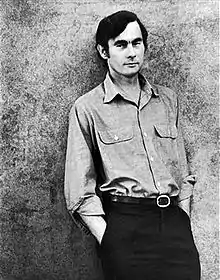Theodore Roszak (scholar)
Theodore Roszak (November 15, 1933 – July 5, 2011) was an American academic who ended his career as Professor Emeritus of history at California State University, East Bay.[1] He is best known for his 1969 text The Making of a Counter Culture.
Theodore Roszak | |
|---|---|
 Roszak, late 1960s | |
| Born | November 15, 1933 Chicago, Illinois, United States |
| Died | July 5, 2011 (aged 77) Berkeley, California, United States |
| Occupation | Author, historian, professor |
| Subject | History Counterculture of the 1960s |
| Notable works | The Making of a Counter Culture |
| Spouse | Betty Roszak |
Background
Roszak received his B.A. from University of California, Los Angeles. He then received his Ph.D. in history from Princeton University in 1958 after completing a doctoral dissertation titled "Thomas Cromwell and the Henrican reformation."[2] He taught at Stanford University, the University of British Columbia, and San Francisco State University before joining Cal State Hayward.[3] During the 1960s, he lived in London, where he edited the newspaper Peace News.[4] He was featured prominently in the "Alternative Lifestyles in California" episode of the 1977 BBC television series, The Long Search.
Theodore Roszak died at age 77 at his home in Berkeley, California, on July 5, 2011.[5]
Scholarship
Roszak first came to public prominence in 1969, with the publication of his The Making of a Counter Culture[6] which chronicled and gave explanation to the European and North American counterculture of the 1960s. He is generally credited with the first use of the term "counterculture".[7]
Other books include Longevity Revolution: As Boomers Become Elders, The Voice of the Earth (in which he coined the term for the budding field of Ecopsychology), Person/Planet, The Cult of Information, The Gendered Atom: Reflections on the Sexual Psychology of Science. He also co-edited (with Mary Gomes and Allen Kanner) the anthology Ecopsychology: Healing the Mind, Restoring the Earth, Where the Wasteland Ends and (with his wife Betty) the anthology Masculine/Feminine: Essays on Sexual Mythology and the Liberation of Women.
His fiction includes a cult novel on the "secret history" of the cinema titled Flicker (Simon and Schuster, Bantam Books and Chicago Review Press) and the award-winning Memoirs of Elizabeth Frankenstein (Random House and Bantam Books). His final novel, published in 2003, is The Devil and Daniel Silverman.
Awards and honors
- New York Open Center in 1999 for his "Prescient and Influential Analysis of American Culture"
- Guggenheim Fellow and was twice nominated for the National Book Award.[3]
- Tiptree Award for The Memoirs of Elizabeth Frankenstein
Scholarship
Non-fiction
- The Dissenting Academy (1968)
- The Making of a Counter Culture (1969)
- Masculine/Feminine: Readings in Sexual Mythology and the Liberation of Women (1969)
- Where the Wasteland Ends (1972)
- Sources (1972)
- Unfinished Animal: The Aquarian Frontier and the Evolution of Consciousness (1975)
- Person/Planet: The Creative Disintegration of Industrial Society (1979)
- From Satori to Silicon Valley (1986)
- Roszak, Theodore (1986). The Cult of Information: The Folklore of Computers and the True Art of Thinking. ISBN 9780520085848.
- Fool's Cycle/Full Cycle (1988) ISBN 0-931191-07-6
- The Voice of the Earth (1992); 2nd edition (2001), Phanes Press, ISBN 978-1890482800
- The Cult of Information: A Neo-Luddite Treatise on High Tech, Artificial Intelligence, and the True Art of Thinking (1994) 2nd edition
- The Gendered Atom (1999)
- Kanner, Roszak, & Gomes. Ecopsychology: Restoring the Earth, Healing the Mind. Sierra Club Books (1995) ISBN 0-87156-406-8
- World Beware! American Triumphalism in an Age of Terror (2006, ISBN 1-897071-02-7)
- The Making of an Elder Culture: Reflections on the Future of America's Most Audacious Generation. (2009) New Society Publishers. ISBN 978-0-86571-661-2
Essays
Fiction
- Pontifex (1974)
- Bugs (1981)
- Dreamwatcher (1985)
- Flicker (1991)
- The Memoirs of Elizabeth Frankenstein (1995)
- The Devil and Daniel Silverman (2003)
References
- "Princeton Alumni Weekly". Princeton University. Retrieved May 11, 2008.
- Roszak, Theodore Matthew (1959). Thomas Cromwell and the Henrican reformation.
- "Stanford Humanities Lab". Stanford University. Archived from the original on September 4, 2007. Retrieved May 11, 2008.
- Fountain, Nigel (1988). Underground: the London Alternative Press, 1966–74. Taylor & Francis. p. 12. ISBN 0-415-00728-3
- "Theodore Roszak (1933–2011)". San Francisco Chronicle. July 1, 2009. Retrieved July 11, 2011.
- "Computing and Counterculture". Stanford University. Archived from the original on March 22, 2010. Retrieved May 11, 2008.
- Martin, Douglas (July 12, 2011). "Theodore Roszak, '60s Expert, Dies at 77". The New York Times.
Sources
External links
| Wikiquote has quotations related to: Theodore Roszak (scholar) |
- ""Social critic and professor Theodore Roszak wrote The Making of a Counter Culture in 1968" – PBS
- "Flashing back to Woodstock" – CNN
- Interview on Forum (KQED)
- Interview
- Maclean's Interview: Theodore Roszak: The Making of an Elder Culture by Anne Kingston. August 20, 2009
| Media offices | ||
|---|---|---|
| Preceded by Hugh Brock |
Editor of Peace News 1964–1965 |
Succeeded by Rod Prince |